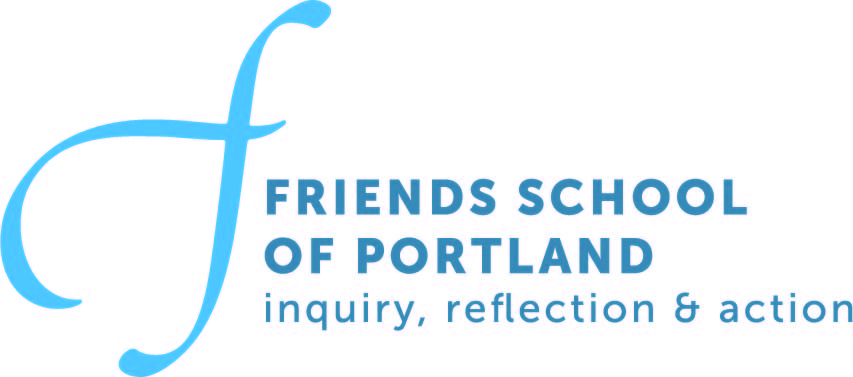Before winter break, in our weekly Wednesday all-school community meeting, kindergarteners gave a “thought for the week” for the school community about the work, learning, and play they do in the forest each week. Using a slide show to show us their forest world, kindergarteners explained how they spend each Thursday and Friday in the forest, where they write in their forest journals, do chores to take care of the space, work on projects, cook food together, and learn how to be in community with one another and with the natural world. When asked which of the SPICES their work in the forest connects to, one kindergartener answered, “Community, because none of what’s out there is yours. It belongs to everyone.”
Friends School of Portland’s founding location on Mackworth Island provided opportunities for students to engage with and learn from the island’s woods and waters. Place-based learning on Mackworth became a cornerstone of FSP’s early curriculum, and students who attended FSP on the island spent their early childhood years (and a good deal of time in later grades) exploring the shores, woods, and hills of the island.
In preparation for the move to our current location in 2015, teachers brainstormed ways we could use the new land intentionally to strengthen students’ learning experiences outside. Inspired by existing forest kindergarten models both in the United States and abroad, FSP’s kindergarten took the opportunity that our new space in Cumberland provided to launch a “forest morning” program one morning each week. The woods around our new home gave us the opportunity to establish a more permanent homebase for the forest program that was not possible on the island.
As Aja Stephan, former kindergarten teacher put it in 2016, “We decided having an ‘educational forest’ would be the best way to give young kids the chance to have wild play in the woods and still conserve the majority of our forest. Along with that, we thought the best way to get us outdoors, really and truly, was to build it into the curriculum for a large portion of one day a week, all day long.” Soon after, with the help of volunteers, many of them parents, we built a fire pit and a platform canvas tent, and the kindergarteners worked with their teachers to define boundaries between the forest classroom and the wild forest.
FSP’s forest kindergarten program has continued to evolve with intention each year. Carie Garrett and Robin Booty, the current kindergarten team, have grown the program to two full days each week, and they have worked to codify and articulate the competencies students are working toward in the forest: stewardship, independence, community, responsibility, self-regulation, and curiosity. As Carie and Robin have written in a recent guide to the Forest program:
“... The kindergarten class at FSP understands what it means to have water to wash hands in the outdoor classroom because they lug jugs of water all the way up the hill to our forest, so when it is their turn to wash their hands they conserve what we have. The very real applications of developing skills help children know themselves, push themselves to try new things, and use these skills in new ways when they are learning and growing across environments.
"Children form and deepen relationships with themselves, each other, and the world around them through their work in the outdoor classroom. They learn to regulate themselves, to ask questions and seek answers, to look out for their classmates, and to take care of our natural world. Then they take this learning with them beyond their kindergarten experience.”
Forest kindergarten is now a cornerstone of our early childhood program that students recall and build on as they grow through the grades at FSP. As we move forward, we will continue to explore ways to deepen and strengthen the program, including our forest classroom infrastructure, so it lives on as a foundation and rite of passage for all future FSP kindergarteners.


